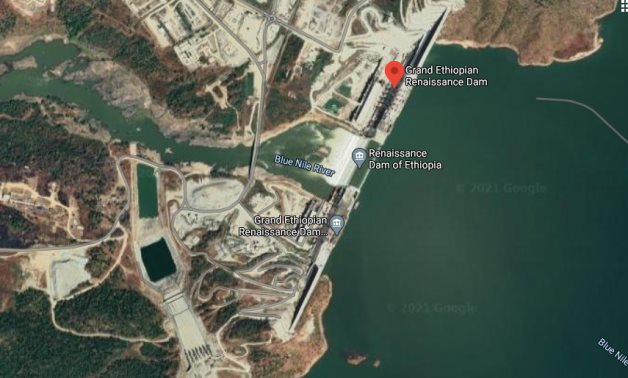
File- A Google satellite image for the controversial Grand Ethiopian Renaissance Dam (GERD)- Egypt Today
CAIRO – 13 April 2023: Egyptian Foreign Deputy Minister for African Affairs Hamdi Loza denounced Ethiopia’s accusation, whicb claims that Egypt politicizes the Nile water and the Grand Ethiopian Renaissance Dam (GERD) file.
Loza added in a press statement on Wednesday that Egypt’s concerns regarding the repercussions of the GERD construction on Egypt’s water security are based on scientific studies.
“The continuous Ethiopian claim that Egypt politicized the issue of the Renaissance Dam is an attempt to evade legal responsibility, and disregard the principles of international law and good neighborliness,” Loza said.
“It is regrettable that Ethiopian officials continue to express their willingness and desire to resume negotiations under the auspices of the African Union, in a new attempt to gain time and continue filling [the dam’s reservoir with the Nile water] without agreement […] the continuation of the negotiations for 10 years without results is evidence of Ethiopian intransigence,” Loza added.
The Egyptian deputy minister of foreign affairs said: “Ethiopia's absolute freedom to continue filling without putting into consideration the rights of the two downstream countries, is another evidence of unilateralism outside the scope of negotiation.”
It was reported that Ethiopia's Minister of State for Foreign Affairs Mesgano Arga stated that Egypt's attempts to politicize the Nile water and the Renaissance Dam will not benefit any party.
Egypt has warned that the continuation of unilateral measures with regard to the Grand Ethiopian Renaissance Dam (GERD) can constitute an “existential danger” on 150 million citizens, in reference to the Egyptian and Sudanese population.
Egyptian Minister of Water Resources and Irrigation Hani Sewilam made the remarks as he delivered Egypt’s speech during the opening plenary of the 2023 UN Water Conference on Wednesday.
“Although it is said that hydroelectric dams cannot cause harm, the fact of the matter is that such unilateral and non-cooperative practices in the operation of this dam of exaggerated size can have a disastrous impact,” Sewilam stressed.
Egypt and Sudan, the downstream countries, have slammed Ethiopia’s rejection to sign a legally-binding agreement on the filling and operation of the dam, which would preserve their interests against possible future dangers.
Officials have also reiterated that Egypt is one of the most water-scarce countries in the world, with the person’s water share placing the country below the global threshold for water scarcity.
Constructions in the Grand Renaissance Dam started on April 2, 2011 at a cost of $4.8 billion. It was built by the Italian construction and engineering company Salini Impergilo. The dam is located on the Blue Nile with a planned reservoir capacity of 74 billion cubic meters, and was expected to generate up to 6,000 megawatts of power.
However, it is estimated to generate only 3,000 megawatts, as the number of turbines to be installed has been reduced to 13 turbines down from 16. At the beginning of this year, the first turbine was installed.
Comments
Leave a Comment